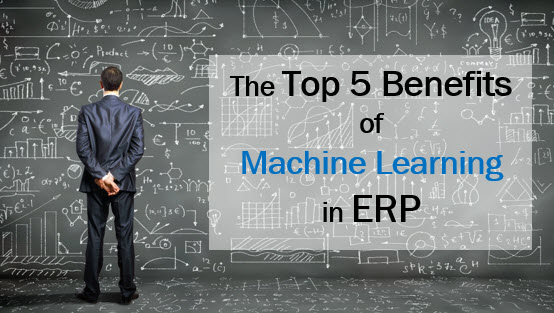From striving to keep supply chains operating efficiently to producing customized, built- to-order products on time – ERP systems with built-in machine learning algorithms are causing a revolution; with the potential to bring greater predictive accuracy to every phase of production, they are aiding organizations in making critical investment decisions.

Not sure if you are ready to take the next steps towards Microsoft Dynamics 365? Here are 5 reasons that you should consider before moving forward.
Integrating Machine Learning in ERP
Although research predicts the machine learning market will reach $15.3 billion by 2019, with modern ERPs being so capable, one might wonder how embedding machine learning into your ERP would add value to systems that are already so advanced. This is because machine learning eliminates many problems that are a part of traditional enterprise software solutions such as:
- Customer and employee related info hardly ever getting updated
- Data entered in ERP systems entirely depends on the quality of the human input
- Assimilation of data from a myriad of spreadsheets is an annual task
- Traditional enterprise systems built on relational databases take weeks to provide insights that are expected immediately

As machine learning enables computer programs to grow and learn by studying predictive and statistical analytics (rather than by being explicitly programmed), the algorithms iterate in milliseconds, enabling you to achieve optimized outcomes in minutes instead of weeks or months. Although predictive analytics is possible without machine learning, machine learning capabilities improve the accuracy of predictive analytics over time.
Why is this integration so important today?
A machine learning enabled ERP can benefit your organization through:
Root Cause Analysis
Run into a maintenance issue? A machine learning enabled ERP system can assist service technicians in root cause analysis for maintenance issues. With early indication about potential hazards, you can take timely measures to avert any danger. What’s more, you can improve Maintenance, Repair and Overhaul (MRO) performance with greater predictive accuracy to the component and part-level and more easily create revenue streams.
Example: Let’s suppose you’re dealing with a maintenance issue. You can enable condition-monitoring processes to manage Overall Equipment Effectiveness (OEE) at the plant level and substantially increase OEE performance.
Customized Insights
Another benefit of integrating machine learning into ERP is the ability to tailor ERP insights in a specific way; a machine learning enabled ERP solution allows organizations to gain insight into their processes, customers, and workflows. By embedding machine learning, you can not only improve the accuracy of insights over time, but also target them specifically to meet your requirements.
Example: Naturally you want to gain a better insight into your sales process, so as results are generated, they could point to a broken process that indicates the need for better inventory management. Or, if you’re looking for specific sales data, an ERP with machine learning capabilities can help in identifying patterns of product preference or even dissatisfaction that the ERP application alone cannot uncover.
Predictive Analytics
Forecasting is one of the most desired elements of any analytics application, including business intelligence or ERP. When integrated with machine learning capabilities, you can use your ERP system to create highly accurate predictive analytics suited to both time and product specifications.
Example: You can use existing historical data to accurately predict seasonal sales growth during a particular period. Or, predict when the stock in the store will get exhausted based on the rate at which it is being used – helping you avoid delays.
Production Capacity
Smart manufacturing organizations that rely on ERP systems with machine learning have the potential to improve yield rates at the machine, production cell, and plant levels. You can optimize utility infrastructure, and improve efficiency inevitably lowering material consumption.
Example: By proactively tuning your equipment for reliability, you can recover a large percentage of your production capacity.
Product Quality
For manufacturers that often face a host of product and service quality issues, Machine Learning comes to the rescue. Using Machine Learning, you can determine which internal processes, workflows, and factors contribute most and least to quality objectives being met.
Example: You can attain much greater manufacturing intelligence by predicting which quality and sourcing decisions contribute the most to greater Six Sigma performance and improve product and service quality largely.
Optimize Processes
With data and data utilization growing at such a tremendous pace, standard ERP capabilities are insufficient, paving the way for machine learning enabled ERP systems. Such systems can provide solutions in the fields of optimization, automation, and worker support by handling complex problems that cannot be solved via static, non-adaptive, computer programs.
By efficiently utilizing the vast amount of data generated by modern systems, you can analyze both structured and unstructured ERP data and get valuable insights (that weren’t possible before), eliminating error-prone routine tasks and optimizing operational processes all along the way. According to Bas de Baat,“AI (and machine learning) will enable organizations to further optimize their operating model made up of business processes, software applications, governance structures, and technology infrastructure.”
Does an ERP solution make sense for your business? Visit Synoptek and find out how we can help with all your business needs.



